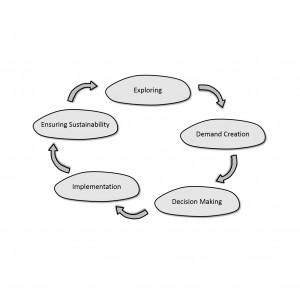In order to achieve holistic
Water, Sanitation and Hygiene (WASH) interventions for refugees and Internally Displaced People (IDPs) in
Rural Settings, good planning is vital. However, the often-weak local capacities and infrastructure as well as the need for working with various local authorities present humanitarian actors in these dispersed rural areas with a number of challenges. In addition, rural areas often show a significantly lower level of emergency preparedness than
Urban Settings, which makes these settings more vulnerable and more in need of effective planning. Lastly, interventions in rural settings must always address both the refugee/IDP populations and the host communities and - in line with the
Linking Relief, Rehabilitation and Development concept - should support overall development in the region.
The Sphere Project
Core Standards describe the essential processes for achieving the
The Sphere Project Standards for humanitarian response. According to the Core Standards, a humanitarian response must ensure 1) a people centered, rights-based approach that takes into account people’s capacity in designing an appropriate response and 2) coordination and collaboration between all organisations and authorities to ensure maximum efficiency, coverage and effectiveness. A participatory approach that includes both the displaced and the host community can increase the quality of the response and community engagement throughout the intervention.
When aiming to achieve the Core Standards, the specific needs relating to the context, target group, location of the displaced, existing capacities in the different rural communities, state of the available infrastructure and stage of the crisis need to be taken into consideration. A full, informative, and impartial
WASH Needs Assessment of both the displaced and local populations’ needs is fundamental to designing a plan for intervention tailored to the unique context.
Using the information gathered during the assessment, a list of planned activities should be created, starting with identifying the overall objectives of the intervention and the institutional/infrastructural gaps present. The plan may need to be tailored to separate dispersed groups of refugees and IDPs depending on their individual level of need for assistance. Self-help initiatives and local authority-led initiatives should be promoted and incorporated into planning. All planning should facilitate incorporating the relevant cultural, spiritual, and traditional practices of all affected groups (see
core standard 4 in the SPHERE Handbook for assessment).
In order to ensure that the planned humanitarian response continues to meet the needs, projects should be adapted based on the outcomes of a continuous monitoring and evaluation, as well as the impact on the affected and wider populations (as stated in SPHERE
Core Standard 5).
This module presents a number of participatory strategies, approaches and tools for effective and needs-based planning in
Rural Settings.


